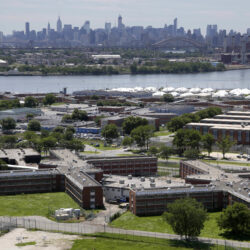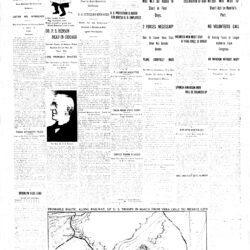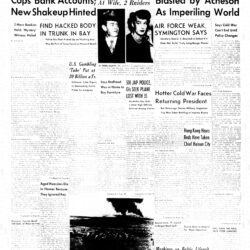
August 6: ON THIS DAY IN HISTORY

ON THIS DAY IN 1868, the Brooklyn Daily Eagle said, “In one of Mrs. Shelley’s poems the end of the world is ushered, to the horror and amusement of the denizens of our planet, by the rising of the sun as a black orb, raying out darkness as formerly it diffused light. This is poetic license with a vengeance. Imagination can conceive an orb which shall be ever dark, by absorbing all the rays of light which fall upon it, while giving out none. But it is beyond imagination to conceive an orb which shall actually ray out darkness — from which rays of blackness shoot out through space, making night wherever they fall. In this age, when the schoolmaster has been abroad for so many years, such an idea is put aside as too preposterous. Nevertheless, the modern high-priests of science have terrors, in their arcana of knowledge, hardly less appalling for common mortals than the expectation that some morning we shall behold the great orb of day rising upon our doomed world as a fountain of night. Besides predicting a speedy exhaustion of our coal-fields, and picturing a state of matters which must infallibly occasion the flight of half our population, and leave the other half dependent upon our woods for fuel — when the yule-log will not only be seen at Christmas, or once-a-week, but all the year round, in our kitchens at least — Science, as represented by its present hierarchs, startles us with the prospect of a far wider calamity. The sun itself, they say, will soon be used up.”
***
ON THIS DAY IN 1873, the Eagle said, “Mr. [Heinrich] Schliemann, whose discoveries in Ancient Troy were yesterday referred to, proposes to establish a museum in Athens, of Homeric antiquities. His collection is said to be of a most interesting character. He has so far identified the site of Troy as to inspire a new interest in the subject among those who can furnish and influence capital for still further researches. That a city presumptively existing for centuries, with a teeming population engaged in pursuits which must have given them eminence in the country, could have completely dropped out of history is a very remarkable fact.”
***
ON THIS DAY IN 1914, the Eagle reported, “WASHINGTON — President Wilson today directed that all officers of the Army and Navy, whether active or retired, refrain from discussing publicly either the military or the political situation in Europe. The following letter was sent by the President to Secretaries Garrison and Daniels: ‘I write to suggest that you request and advise all officers of the service, whether active or retired, to refrain from public comment of any kind upon the military or political situation on the other side of the water. I would be obliged if you would let them know that the request and advice comes from me. It seems to me highly unwise and improper that officers of the Army and Navy of the United States should make any public utterance to which any color of political or military criticism can be given where other nations are involved. Cordially and faithfully yours, (Signed) Woodrow Wilson.’”
***
ON THIS DAY IN 1941, the Eagle reported, “WASHINGTON (U.P.) — Secretary of State [Cordell] Hull told his press conference today that any move by Japan into Thailand would be a matter of concern to the United States. The statement was made in response to questions inspired by the declaration of British Foreign Minister Anthony Eden that anything involving Thailand was of great interest to Great Britain. Hull said that the United States many times had made clear its opposition to conquests by force. These statements, he said, had made clear the United States’ interest and position.”
***
ON THIS DAY IN 1954, the Eagle reported, “WASHINGTON (U.P.) — The Air Force today opened the way for American industry to seize the lead from Britain in a race for jet passenger plane supremacy. Air Secretary Harold E. Talbott announced that this country’s first jet airliner, the 550-mile-an-hour Boeing, model 707, has been ordered into production as a high-flying tanker for refueling jet bombers in flight. His announcement signifies vast increase in range and striking power for the Air Force bomber fleets. And it also means the bottleneck which held America back in the jet age passenger plane race has been broken. A $15,000,000 gamble by the Boeing Airplane Company at Seattle, which developed the plane on speculation, has paid off.”
***
ON THIS DAY IN 1954, the Eagle reported, “LAS VEGAS, N.M. (U.P.) — Some two dozen survivors of Col. Teddy Roosevelt’s Rough-Riders’ charge up San Juan Hill in ’98 assembled today in their 50th annual convention. They represented less than a third of the 78 known living veterans of Roosevelt’s Cuban campaign in the Spanish-American War. Mr. and Mrs. Billy Gibson of Brooklyn were among the first to check in. There won’t be much whooping-it-up as in the old days. The Spanish-American War is a long way back. Few formalities exist when ‘Teddy’s boys’ gather. Most of their time is spent on hotel porches, adding twists and tangents to the tales they all know by heart but laugh harder at each year.”
***

Charles Sykes/Invision/AP

Charles Sykes/Invision/AP
NOTABLE PEOPLE BORN ON THIS DAY include science fiction author Piers Anthony, who was born in 1934; “The Bob Newhart Show” star Peter Bonerz, who was born in 1938; “Days of Our Lives” star Louise Sorel, who was born in 1940; “The Jesse Owens Story” star Dorian Harewood, who was born in 1950; “7th Heaven” star Catherine Hicks, who was born in 1951; 1978 National League Rookie of the Year Bob Horner, who was born in 1957; “Crouching Tiger, Hidden Dragon” star Michelle Yeoh, who was born in 1962; Basketball Hall of Famer David Robinson, who was born in 1965; ESPN host Mike Greenberg, who was born in 1967; “Unbreakable” director M. Night Shyamalan, who was born in 1970; Spice Girl Geri Halliwell, who was born in 1972; “Up in the Air” star Vera Farmiga, who was born in 1973; ESPN host Max Kellerman, who was born in 1973; “Punky Brewster” star Soleil Moon Frye, who was born in 1976; and former NFL quarterback Seneca Wallace, who was born in 1980.

Jordan Strauss/Invision/AP
***
POET’S CORNER: Alfred, Lord Tennyson was born on this day in 1809. The English poet’s most celebrated works include “The Lady of Shalott” and “Ulysses” and the verse novelettes “Maud,” “Enoch Arden,” “In Memoriam,” “Locksley Hall Sixty Years After” and “The Idylls of the King.” He succeeded William Wordsworth as English poet laureate in 1850. He died in 1892.
***
WAR IS HELL: The first atomic bomb was dropped on Japan on this day in 1945. The Enola Gay, an American B-29 bomber, dropped the bomb over Hiroshima, killing 80,000 civilians and destroying the city. It is estimated that another 100,000 people were injured and died subsequently as a direct result of the bomb and the radiation it produced. Another bomb was dropped on Nagasaki three days later. On Sept. 2, Japan officially surrendered to the Allies, ending World War II.
***
Special thanks to “Chase’s Calendar of Events” and Brooklyn Public Library.
Quotable:
“He makes no friends who never made a foe.”
— poet Alfred, Lord Tennyson, who was born on this day in 1809

Leave a Comment
Leave a Comment





